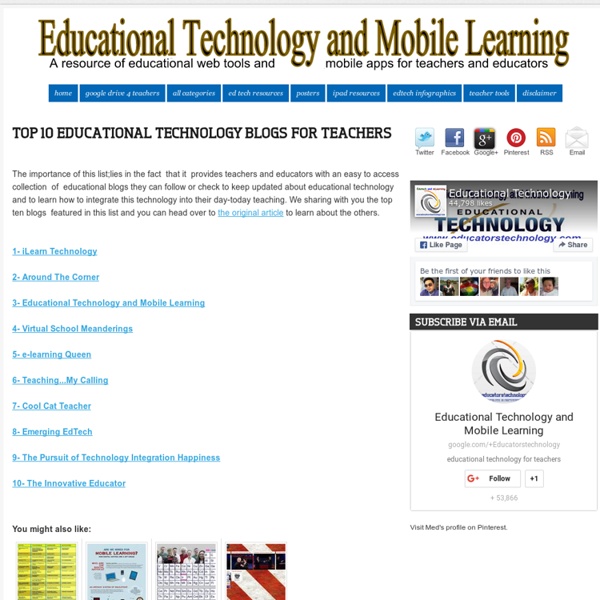Cool Cat Teacher Blog
Lifelong Learning for School Librarians
Risorse varie per la gestione scolastica
Risorse varie utili per gestire le attività scolastiche dei docenti. Affina la ricerca Doodle Stabilire un qualsiasi evento di gruppo, stabilire una preferenza, creare un sondaggio, inoltrare il link del sondaggio ai vari partecipanti, seguire online l’andamento del sondaggio. Vai » Class Tools Applicazione online per creare giochi, attività e diagrammi in tecnologia flash, utile agli insegnanti per creare attività personalizzate da impiegare nella prassi didattica (dai post it alle time line). Vai » Slide finder Motore di ricerca di slide per presentazioni PowerPoint, una risorsa preziosa per le lezioni degli insegnati che qui possono trovare presentazioni pronte all’uso sui più diversi argomenti. Winiride Software free sviluppato da INDIRE su incarico del MIUR, utile per la catalogazione e la gestione delle risorse di una mediateca o biblioteca scolastica. Vai » LuBook Software per la catalogazione dei libri. Vai » Gestione biblioteca Vai » Disposizione degli alunni Vai » Formazione classi prime
NSW DEC Raps and Book Raps
Current & planned raps Join a reading adventure! A rap supporting reading and literacy, this offers a range of exciting reading ideas, activities for K-10, resources and ebooks to dip into, and a space for you to share your reading adventures. Term 1, 2013 All about me, all about you is a 5 week rap, commencing on Monday February 25, supporting autobiographical writing in Stage 3 and 4 English. Raft, river, rainbow fiction blog is a 5 week rap, commencing on Monday February 25, supporting narrative writing in Stage 3 and 4 English. Term 2, 2013 Band of heroes fantasy quest is a 5 week rap, commencing in Term 2, Week 3, on Monday May 13, supporting narrative writing in Stages 3 to 5 English. Term 3, 2013 Hats, boxes, magic, moon is a 5 week rap, commencing in Term 3, Week 3, on Monday July 29, supporting narrative writing in Stages 3 and 4 English. Term 4, 2013 Book Week 2012: Use the activities in Join a reading adventure! Term 4, 2012 Term 2, 2011 Shaun Tan: The lost thing, stories & more
Free Technology for Teachers
100 Helpful Blogs For School Librarians (And Teachers)
We love librarians. They’re the gatekeepers of knowledge and always looking to explore new ways to enhance the learning experience . I learned about the latest trends in libraries at this year’s CALICON in San Diego and love the move toward open source, cross-library sharing, and going digital. But what if you weren’t able to attend CALICON or simply want to get a regular update on all the fun stuff happening with libraries? Looking for great Twitter chats for librarians? NOTE: This is an update of Online College’s previous list , as technology has changed, new voices have emerged, and some previously great blogs have gone dormant, making it necessary to revise and re-curate selections. Librarian Blogs Here you’ll find some amazing blogs written by librarians at all kinds of institutions. Free Range Librarian : Librarian K.G. School Librarian Blogs These blogs are ideal reading for school librarians who want to connect with others in the profession. Teacher Librarians Industry News Ed Tech
Free Lesson Plans That Mix Tech and Ed
Over the years, I’ve developed a list of lesson plans that nicely integrate technology into core classroom subjects like, science, language arts, spelling, math, history and more. To share them, click here, on Free Lesson Plans. When you get to the page, you’ll find 112 options. They all don’t have links. As you start this school year, feel free to ask questions of Ask a Tech Teacher. Like this: Like Loading...
Florida Center for Reading Research
Kathy Schrock's Kaffeeklatsch
Bianca Hewes | D.I.Y. teaching and learning
L'IMmagin@zione in classe



